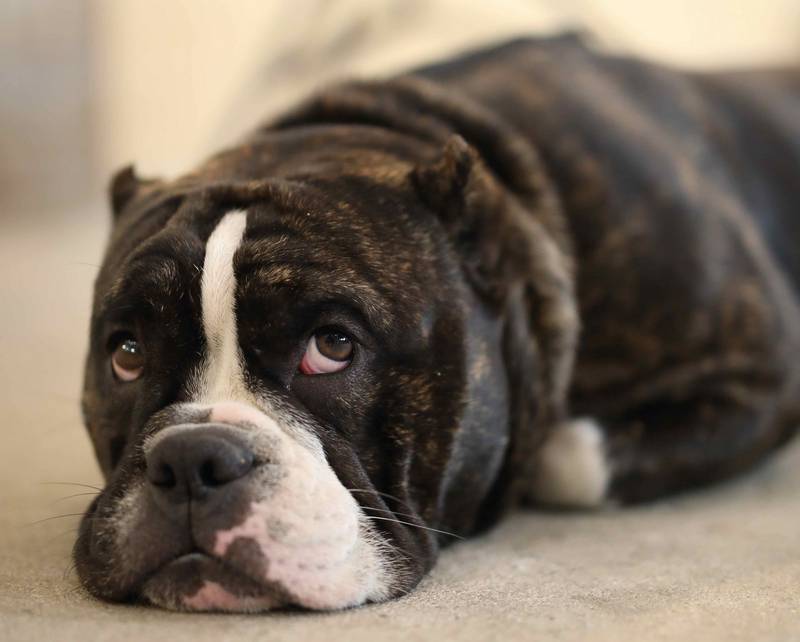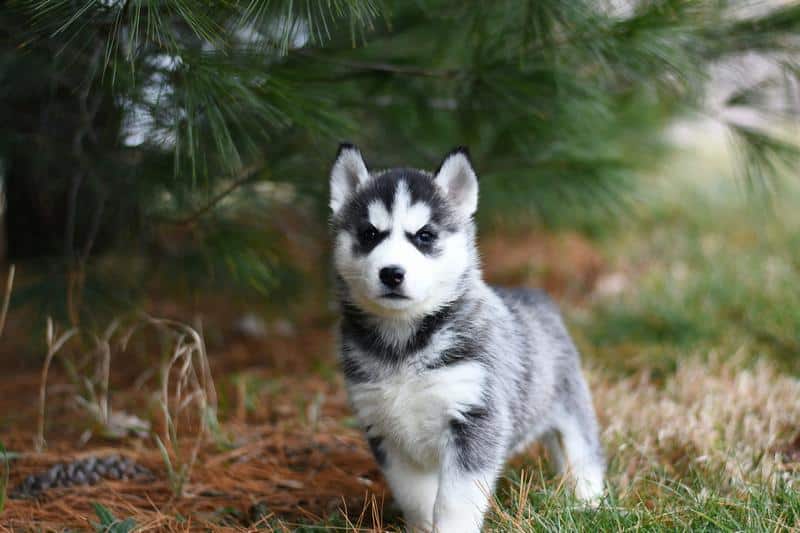“My Dog Barks at Me When I Say No!” How to Fix! (Easy)
It’s an all too familiar scenario for some pet owners: your dog barks at you when you say no. While it can be confusing or even frustrating, understanding this behavior is key to managing it effectively.
In the upcoming sections, we’ll explore why your dog might be barking back when you issue a “no”, and of course, how to put a stop to it. It’s not just older dogs – we’ll even address those feisty puppies that seem to have something to say about everything, from playtime to mealtime, and even when they’re told ‘no’ at night.
Curious to find out why your pet is ‘talking back’? Find out in our article “My Dog Barks at Me When I Say No” below!
Dog Barks When I Say No: How to Stop It

To stop dog barking at you when you say no, you need to reassert yourself as in charge by teaching them to be silent on command. To do so, take your dog somewhere they like to bark (like the park) with plenty of small treats.
When your dog starts to bark, say “quiet” in a positive, calm voice. If they look at you, immediately give a treat and praise. But if they quickly resume barking again or never give you their attention, then hide a treat inside of your fist.
Put your fist next to your dog’s nose. Your dog will be able to detect the scent even with the treat inside of your fist, and will stop barking to investigate it. Once they’ve done so and also given you their attention, again say “quiet,” and then open your hand to reward them with a treat along with praise.
If your dog keeps being quiet, continue rewarding them with a treat and praise. But if they resume barking, whether it’s at you or something else, repeat the process with hiding a treat inside of your fist, putting it near their nose, and then pausing until they’re quiet.
Make sure that you’re waiting until your dog has gotten quiet to reward them with their treat and praise. This will help to form a positive connection in their mind with being silent and paying attention whenever you say “quiet.” Immediately reward them with the treats and praise when they do.
With time, consistency, and repetition, your dog will quiet just by you giving the command, and without you needing to put your hand by their mouth. You should then begin lengthening the amount of time before you give them their rewards. Start with just a couple of seconds, then move that up to 5 seconds, and so on.
It won’t be long until the food rewards and praise won’t be needed anymore and you can get your dog to stop barking for any reason just by giving the “quiet” command.
But while these steps will get your dog to stop barking when you say no, it’s important to remember that the underlying behavioral issues (likely dominance or demand barking) that were causing all of this to begin with will still be present. And until you address those, any positive changes you see are only going to be temporary.
“Well, how do I make them last then?”
By getting your dog to truly choose to follow your direction, that’s how. I tried many times to write out how you can do that before deciding it made more sense to just link you to the free video series that explains it better than I’d ever be able to.
The series is by a man named Dan who is one of the world’s leading dog obedience trainers. In it, he teaches you how to put an end to things like when your dog barks when you say no and all other misbehavior using his fast and easy-to-follow methods.
In the first video, Dan will reveal to you why the two most common methods of dog training only doom you to failure. You can watch the video now by clicking here. Follow the proven system he’ll show you in his series and you’ll never have to spend another second worrying about your dog barking when you say no ever again!
Why Does My Dog Bark at Me When I Tell Him No?

When your dog barks at you after being told “no,” it can be both frustrating and confusing. This behavior can stem from a number of causes, including a behavior known as demand barking, frustration, and confusion.
Demand Barking
Demand barking is a behavior where dogs bark to get what they want, such as food, attention, or playtime. If your dog barks when you tell him “no,” he might be demand barking. In his mind, barking is a strategy to get what he wants or to engage with you, even if the engagement is due to a negative behavior.
Confusion
Your dog may not fully understand what “no” means, especially if the command isn’t linked to a specific behavior. If you’re telling your dog “no” without clearly indicating what behavior you want him to stop, he might bark out of confusion or frustration.
Frustration
Similar to puppies, adult dogs can also bark out of frustration when told “no”. If they were engaged in an activity they found enjoyable, like digging or chewing, being told to stop can result in a frustrated response.
Addressing the Behavior
To address this behavior, try to be clear and consistent in your training. Instead of only saying “no,” redirect your dog’s behavior to something appropriate and reward him for complying. If demand barking is the issue, it’s important not to give in, as this reinforces the behavior. Instead, ignore the barking and reward your dog when he is quiet and calm.
Remember, understanding the root of your dog’s behavior is key to effectively addressing it. Patience, consistency, and positive reinforcement will go a long way in establishing effective communication with your dog. Learn more about controlling this behavior and also getting down to the root issue in the first section of this article.
My Puppy Barks at Me When I Say No
If your puppy barks at you when you say no, it can feel like they’re talking back or challenging your authority. In reality, this behavior is usually a form of communication or a response to confusion or frustration.
Confusion
Puppies may not immediately understand what “no” means. If you say “no” and your puppy barks back, they might be expressing confusion. They don’t understand what you want from them, and the barking is their way of communicating that.
Frustration
Sometimes, a puppy might bark in response to the word “no” out of frustration. If they were engaged in an activity they found enjoyable, like chewing a shoe or digging in the yard, and they’re told to stop, they might bark as a way to express their displeasure.
Seeking Attention
Your puppy might also be barking for attention. If they’ve learned that barking gets your attention, even if it’s negative attention, they might bark when you say “no” to continue the interaction.
Training a More Effective Response
To address this behavior, it’s important to be consistent and clear in your training. Instead of simply saying “no”, redirect your puppy’s behavior towards something positive. For example, if they’re chewing on a shoe, redirect them to a toy. Reward them when they engage in positive behavior. This helps them understand what you want from them.
Remember, patience and consistency are key when training a puppy. It might take some time, but with positive reinforcement and clear communication, your puppy will learn to understand and respond appropriately to your commands. Find out more about teaching them a quiet command by going back to the first section of this article.
Doing nothing and allowing your dog’s misbehavior to continue will only lead to it getting worse and expanding. You’ll soon find your dog barking for their ball and barking to demand breakfast, or even snapping at other dogs, getting aggressive with your husband or towards your baby!
My Puppy Growls at Me When I Say No
If your puppy growls at you when you say “No,” it can be a bit disconcerting, but it’s not uncommon. Here are some reasons why this might be happening:
- Confusion: Puppies may not understand what “No” means. Without proper training, your puppy might just be confused and react with a growl.
- Fear or Anxiety: If your puppy interprets “No” as a threat, they might growl as a defensive response. The tone and volume of your voice can play a big part in how your puppy interprets your command.
- Pushing Boundaries: Puppies, much like human children, might test their boundaries. If growling has worked to stop an unwanted action in the past, they might try it again.
- Playfulness: Sometimes, puppies can misinterpret your tone and think you’re initiating play. This can result in growling, which is a common part of puppy play.
Understanding why your puppy is growling can help you adjust your training methods accordingly. Remember, positive reinforcement is generally more effective than negative reinforcement. If your puppy continues to growl, you should begin working to address the root cause of the behavior. Go back to the first section of this article and we’ll explain more.
Puppy Barking at Me During Play
If your puppy is barking at you during play, it’s usually a sign of excitement and engagement. Puppies often use barking as a way to initiate play and keep it going. This is a natural part of their social behavior, and it’s a good sign that your puppy is having fun and wants to interact with you.
When puppies play with each other, they use a variety of vocalizations, including barks, growls, and whines in addition to physical displays like play bows or wagging tails. They’re learning to communicate and experimenting with different sounds. When they bark at you during play, they’re likely trying to engage you in the same way.
Here are a few other reasons why your puppy might bark at you during play:
- They might be trying to get your attention. If they want to play and you’re not engaging, they might bark to get you to join in.
- They could be frustrated. If they can’t reach a toy or can’t get you to play the way they want, they might bark out of frustration.
- They might be overly excited. Puppies sometimes have trouble controlling their energy levels, and when they get too excited, they might start barking.
While barking during play is normal, it’s important to teach your puppy to play quietly as well. This can be done using positive reinforcement techniques, such as rewarding them for playing quietly and taking a break if they start barking too much.
If you’re having trouble managing your puppy’s barking, go back to the first section of this article now. We’ll teach you how to stop their barking on command, while also addressing the root cause of the behavior.
Puppy Barks When I Say No About Food
If your puppy barks when you say “no” about food, it’s likely a sign of frustration or misunderstanding. Puppies, much like human babies, are still learning the ropes and understanding what “no” means. They might bark because they don’t understand why they’re being denied something they want.
Food is a significant motivator for dogs, and puppies are no different. If they’ve set their sights on a delicious morsel you’re preparing or in the middle of eating, being told “no” might elicit a vocal protest in the form of barking.
Here are a few other reasons your puppy might bark when you say “no” about food:
- They might be feeling confused. If they don’t understand why they can’t have the food, they might bark to express their confusion.
- They might be trying to communicate with you. In their own way, they’re saying, “But I want it!”
- They could be testing boundaries. Puppies are known for pushing limits as they learn and grow.
It’s important to maintain patience and consistency when dealing with this behavior. Try using positive reinforcement to teach your puppy that they get rewarded when they behave the way you want, such as waiting patiently for food or ignoring food when told “no.”
If your puppy’s barking is causing issues, or if you’re having trouble managing their behavior around food, you should begin working with them right away on behavioral training. Go back to the first section now where we’ll teach you a quiet command, and also how to get down to the root issue.
Puppy Barks When Told No at Night
If your puppy barks when told “No” at night, it can certainly disrupt a peaceful evening. There are several reasons why this might be happening:
- Testing Boundaries: Puppies often test boundaries as part of their learning process. If your puppy is told “No” at night, they may bark in response as they’re figuring out what’s acceptable and what isn’t.
- Night-time Anxiety: Some puppies may feel more anxious or uncertain at night. If they’re told “No” during this time, they might react with barking because they’re already feeling stressed.
- Misunderstanding: If your puppy doesn’t understand the meaning of “No,” they might respond with barking out of confusion or frustration.
- Attention Seeking: Puppies crave attention, and if they learn that barking gets them attention, even if it’s negative, they might bark when told “No.”
Understanding why your puppy is barking at night can help you address this behavior effectively. Consistent, positive reinforcement training can go a long way in teaching your puppy what is expected of them. Learn how to do this by teaching them a quiet command, and also how to address any root causes, by going back to the first section of this article now.
I’m sure you’re ready to get your dog to quit barking when they’re told no, so I’ll let you get started on things now. Best wishes with everything, and thank you for checking out our article “My Dog Barks at Me When I Say No!”





